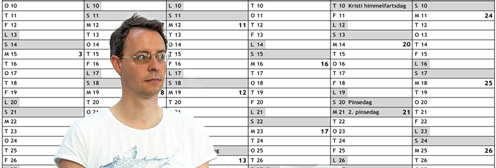Research project “Intentions, Selection and Agency” granted 5.6 million DKK

Thor Grünbaum is the primary investigator of the project
The research project “Intentions, Selection and Agency” has just been granted 5.6 millions from the Danish Council for Independent Research (DFF). The project is a collaboration between Department of Media, Cognition and Communication (MCC) and Department of Psychology at the University of Copenhagen with Associate Professor from MCC Thor Grünbaum as principal investigator and Professor Søren Kyllingsbæk from Psychology as co-investigator.
How do you remember what you wanted to do? Intentions and actions
The research project investigates how people remember what they have previously decided to do, their so-called intentions. ”For instance, I may decide that I will be leaving for Aarhus Monday morning or call my sister this evening, in fact throughout the day I make such decisions about my actions in the future” says Thor Grünbaum, who wrote the application for DFF and is one of the two central figures behind the project.
When time comes to act out these intentions, people have to remember their decisions. It is this issue that the research project revolves around. With the help of philosophical analyses and experimental-psychology Grünbaum and Kyllingsbæk intend to answer questions such as ”How do people remember what they have decided to do?” and “How are those intentions stored and later, when the time is right, retrieved?”
Selection
According to Grünbaum, this subject has received surprisingly modest attention in both philosophy and psychology, despite the fact that the phenomenon is important in a number of models within both disciplines. Our lives would simply not be the same if we could not remember what we intended to do at a later time. The ability to remember decisions touches upon questions such as psychological continuity, which is important in relation to personal identity, as well as prospective memory and philosophy of action.
One important issue for models of prospective memory is that there must be a vast amount of decisions represented at any given time. The interesting question for the research project is therefore how the mental system manages to locate and select the correct decisions at the correct times. The project also touches on questions of agency and what it means to be an acting person with an ability to control one’s own life. The project will therefore contribute to the existing debates on free will.
5.6 millions from the Danish Council for Independent Research
Thor Grünbaum and Søren Kyllingsbæk have now been granted 5,6 mio. DKK from the Danish Council for Independent Research (DFF). The grant will be spent on research and hiring of two PhD-students in psychology and philosophy respectively. The psychology PhD-student has already been found in the person of Franziska Traub, who will be doing her research in experimental psychology. The PhD-student in philosophy is yet to be found. Besides PhD-students, the grant will finance a range of research activities such as workshops, conferences as well as guest researchers and guest lecturers.
Research of the highest quality
In theDFF international assessment “Intentions, Selection and Agency” received the highest score possible. As ending remarks, the peer review panel noted that: “This is an exceptionally strong proposal. It offers a detailed statement of a distinctive and promising set of objectives, and involves an exemplary plan for bringing together work in philosophy and psychology on the nature of action control in ways that are mutually illuminating (without pretending to erase the boundaries of the two disciplines). The project promises to break important new ground, which will have significant consequences for our understanding of agency, with a number of fruitful philosophical and psychological ramifications.”
It seems evident that Grünbaum’s research project on intentions and memory will illuminate new aspects of agency by bringing together the disciplines of philosophy and psychology. The grant from DFF will provide the project with a much deserved kick-start.
